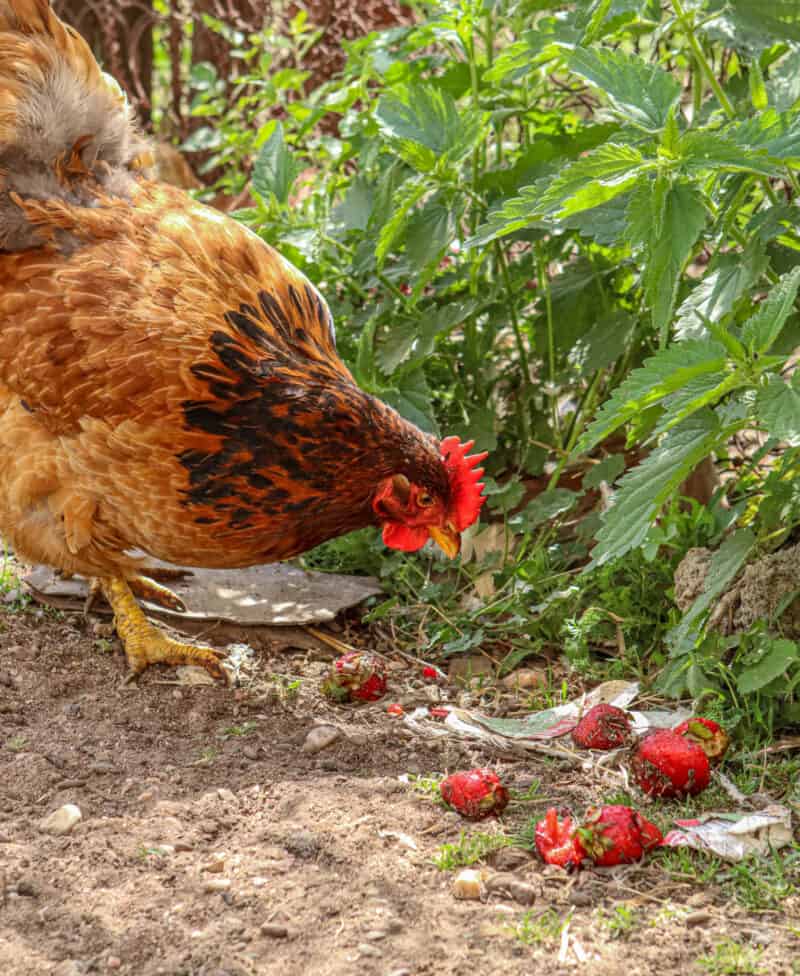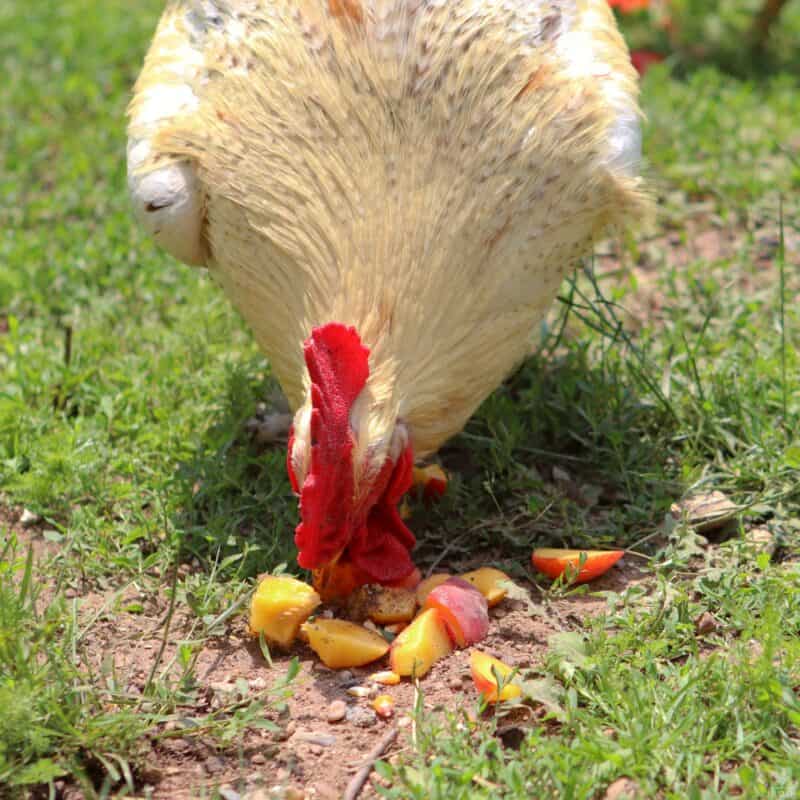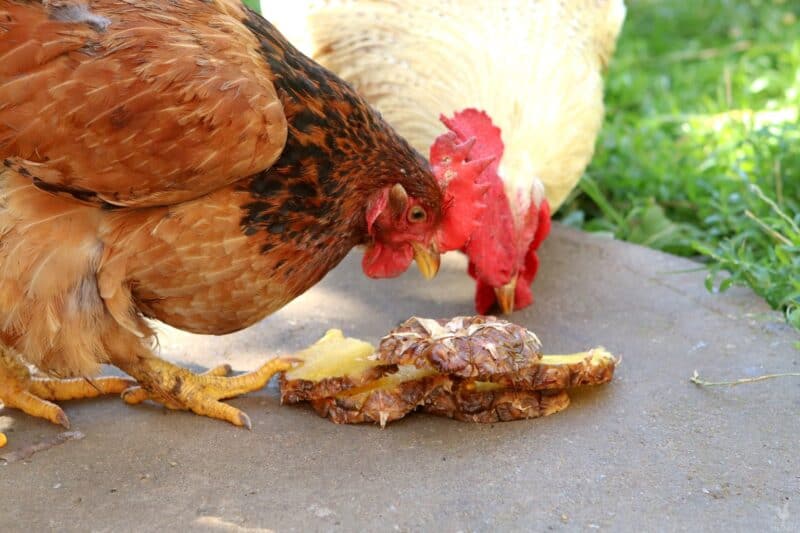If you have chickens, you know that they generally live day in and day out eating dry, hard chicken feed. They would probably appreciate a treat, but anything that you treat your chickens should still be wholesome and nutritious.

How about fruit? Can chickens eat fruit?
Yes, generally speaking, chickens can have all kinds of fruit with a few notable exceptions. So long as you feed chickens fruit and moderation as part of a well-rounded diet, it can provide them with extra nutrition. Apples, pumpkins, and watermelons are some of the very best fruits to feed your chickens, and can supply abundant vitamin A, multiple B vitamins, and various minerals.
It seems like an obvious answer, because when you think about it chickens would have opportunity to eat fruit in the wild.
However, knowing what kinds of fruit chickens can eat, what parts of fruit are not safe for them to eat, and how often you should give them fruit as part of their diet is an important part of being a responsible owner.
We will tell you everything you need to know about giving fruit to your flock in the rest of this article.
Fruit Can Give Your Chickens a Big Boost of Vitamins and Minerals
Fruit, like most produce, is one of the best ways to supplement the diet of your chickens.
Pretty much every kind of fruit you can think of off the top of your head is generally safe for chickens to eat and has a varying amount of vitamins and minerals that can improve the health of your birds.
Many of these common vitamins and minerals help your birds in the same or similar ways that they help people, doing everything from boosting immune system health and fighting disease to increasing cellular regeneration, improving blood clotting, the health of feathers, and more.
Fruit is also an excellent option for giving your chickens some quick energy, and, just like most people, they will certainly love the taste.
Fruit also has a big benefit in hot weather as it will help to keep your birds hydrated and stave off heat stress.
No matter how you slice it, if you’ll pardon the pun, fruit is a great thing to give to your chickens but you must give it to them in moderation.
We will talk a little bit more about that below.

Can Chickens Eat Fruit Raw?
Yes, any fruit that chickens can eat safely they can safely eat raw. This is true of most foods that chickens eat with one or two rare, rare exceptions like acorns.
In fact, you will generally want to give your chickens raw fruit as this will maximize their nutritional value and generally improve the taste and texture for them.
Here are some of the fruits chicken can safely eat raw:
Can Chickens Eat Fruit Cooked?
Once again, any fruit that chickens can eat safely they may also eat safely if it has been cooked, generally speaking.
If you really want to go all out and give your chickens a treat you could grill firm fruits like peaches or pineapples before giving it to them to concentrate a flavor a little bit or just let them try something brand new.
But, most of the time, this is completely unnecessary when it comes to fruit.
Chickens eat pretty much everything raw and fruit is no different.
Can Chickens Eat the Seeds of Fruit?
When it comes to eating the seeds of fruit you’ll have to be a little more cautious compared to the flesh.
Certain fruits have seeds that chickens can eat with complete safety. Other fruits have seeds that contain dangerous compounds that might be harmful or even fatal to chickens, often cyanide.
Seeds that chickens definitely shouldn’t eat include apples, peaches, apricot, and avocado.

Can Chickens Eat the Skins or Peels of Fruit?
Most of the time, if a chicken can safely eat the flesh of a fruit it can also eat the skin or peel, though many chickens prefer to avoid it entirely because it is not very tasty and can be difficult to swallow.
There are some notable exceptions, however.
Avocado skin contains the dangerous toxin persin, and the heavy rind of some other fruits like watermelon is virtually impossible for your chickens to eat.
Never Feed Fruit to Chickens that Has Been Prepared with Harmful Ingredients
It should go without saying, but you never want to give your chickens fruit that has added ingredients or is itself serving as an ingredient in something that is harmful for them.
You don’t want to give them any candied or sugared fruit, fruit cooked with butter, or fruit that is serving as a jam, jelly, preserve, pie filling, or anything like that.
At the very best, this will cause significant weight gain due to excess calories, and likely serious digestive upset as well. But at worst, this can cause major disease or even death in your birds.
No matter how cute or funny you think it is or how tasty you think they will find it, don’t give any such fruit or food made from fruit to your chickens.
Beware of Pesticides on Grocery-bought Fruit
Any fruit that you buy from the grocery store should be thoroughly washed to remove pesticide residues from the skin. If you are in doubt, peel the fruit and discard the skin.
Many common pesticides can build up in the tissues of your chickens over time and eventually lead to major health complications.
If you can, buy organic or grow your own so you know precisely what will be going into your chicken’s bodies.
How Often Can Chickens Have Fruit?
You might think that since fruit is all-natural, healthy and your chickens love it you can give it to them pretty much anytime, but this just isn’t true.
Chickens should be fed a high quality, nutritionally complete chicken feed just about all the time, with anywhere from 80% to 90% of their calories coming from the feed.
The remaining 10% to 20% of their calorie intake should come from treats and supplemental food items like fruit, and preferably a variety to prevent over-ingestion of a given vitamin or mineral.
Problems Associated with Eating Too Much Fruit
Serving your chickens too much fruit can and will cause problems in short order, especially if they are eating it regularly.
Often times the moisture and sugar content of the fruit creates an imbalance in the environment of the crop or gizzard.
Chickens, much of the time, eat food that is totally dry or nearly so, and when they eat moist food regularly it can lead to outbreaks of yeast, bacteria, and other conditions like sour crop.
At best, too much moist food will lead to loose and watery stools or diarrhea, which has the attendant risk of dehydration or electrolyte imbalance in your birds.
Stick to the regimen if you want to give your birds fruit regularly and safely!
Prepare Fruit Properly for Best Results
There are all kinds of ways to prepare fruit for serving to chickens, but the best way depends entirely on the type of fruit and the personalities and sizes of your birds.
Chickens don’t chew their food, instead swallowing it whole or it will be chewed internally by the gizzard.
This means that the flesh of the fruit should be exposed in a way that a chicken can easily tear off a small, bite-sized portion with their beak.
Or, in the case of firm or whole but small fruits like grapes, you’ll need to chop them up into bite-sized pieces that they can handle.
Can Baby Chicks Have Fruit, Too?
Believe it or not, chicks can have fruit also, but as a rule, you will generally want to wait until they are at least 6 weeks of age.
Chicks have extremely delicate constitutions, and their digestive systems are vulnerable to upset from all sorts of factors, namely excess moisture and sugar to say nothing of novel foods.
Chicks are also quite vulnerable to choking and crop impaction, so you must choose fruit carefully and give it to them very sparingly if you want to be a healthy treat or snack for them.
Tom has lived and worked on farms and homesteads from the Carolinas to Kentucky and beyond. He is passionate about helping people prepare for tough times by embracing lifestyles of self-sufficiency.
